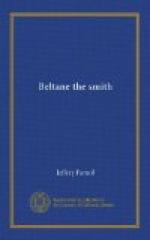“Most holy father, thou knowest how I have lived within the greenwood all my days nor found it lonely, for I did love it so, that I had thought to die here likewise when my time should come. Yet now do I know that this shall never be—to-day I go hence.”
“Wherefore, my son?”
“There is come a strange restlessness upon me, a riot and fever of the blood whereby I am filled with dreams and strange desires. I would go forth into the great world of men and cities, to take my rightful place therein, for until a man hath loved and joyed and sorrowed with his fellows, he knoweth nought of life.”
“Perchance, my son, this is but the tide of youthful blood that tingles in thy veins? Or is it that thou hast looked of late within a woman’s eyes?”
Then Beltane kneeled him at the feet of Ambrose and hid his face betwixt his knees, as he had been wont to do whiles yet a little child.
“Father,” he murmured, “thou hast said.” Now looking down upon this golden head, Ambrose sighed and drew the long curls through his fingers with a wondrous gentleness.
“Tell me of thy love, Beltane,” said he.
Forthwith, starting to his feet, Beltane answered:
“’Tis many long and weary months, my father, and yet doth seem but yesterday. She came to me riding upon a milk-white steed. At first methought her of the fairy kind thither drawn by my poor singing, yet, when I looked on her again, I knew her to be woman. And she was fair— O very fair, my father. I may not tell her beauty for ’twas compounded of all beauteous things, of the snow of lilies, the breath of flowers, the gleam of stars on moving waters, the music of streams, the murmur of wind in trees—I cannot tell thee more but that there is a flame doth hide within her hair, and for her eyes—O methinks ’tis for her eyes I do love her most—love her? Aye, my body doth burn and thrill with love—alas, poor fool, alas it should be so! But, for that she is proud and of an high estate, for that I am I, a poor worker of iron whom men call Beltane the Smith, fit but to sigh and sigh and forever sigh, to dream of her and nothing more—so must I go hence, leaving the sweet silence of the woods for the strife and noise of cities, learning to share the burdens of my fellows. See you not, my father, see you not the way of it?” So spake Beltane, hot and passionate, striding to and fro upon the sward, while Ambrose sat with bitterness in his heart but with eyes ineffably gentle.
“And is this love of thine so hopeless, my Beltane?”
“Beyond all thought; she is the Duchess Helen of Mortain!”
Now for a while the hermit spake not, sitting chin in hand as one who halts betwixt two courses.
“’Tis strange,” he said at length, “and passing strange! Yet, since ’tis she, and she so much above thee, wherefore would ye leave the tender twilight of these forests?”
Quoth Beltane, sighing:




